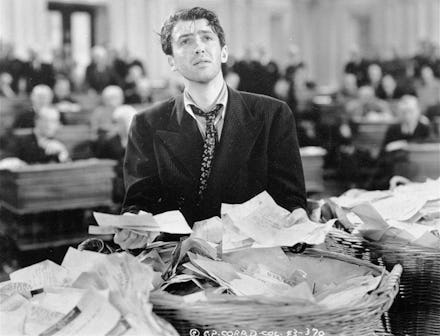6 Classic Movies That Changed the Course of American Politics

Last week, Hollywood producer and media mogul Harvey Weinstein announced that The Weinstein Co., his production company, will produce The Senator's Wife, an anti-NRA film that would star Meryl Streep and, in his words, make the NRA "wish they weren't alive."
Though few details have been released about the project, Weinstein has stated that it will not be a documentary, but a "big movie like Mr. Smith Goes to Washington," Frank Capra's 1939 film criticizing government corruption. Unlike that film, it will not feature the loveable Jimmy Stewart. But I digress.
Though we usually expect documentaries to make a political impact, there have actually been many fiction films that have had even more significant impacts. Here are six films that changed the course of American politics:
1. 'Mr. Smith Goes to Washington' (1939)
Frank Capra's 1939 political comedy-drama is a classic for its entertaining yet sharp critique of corruption in American politics. A naive young man, played by Jimmy Stewart, becomes a junior senator, only to be immediately manipulated by a corrupt political machine. He believes in lost causes; they believe in making money off the electorate.
The film's negative portrayal of the American government was far from well-received: government officials and senate members blistered at the film, with one dismissing it as a "grotesque distortion" of the Senate. However, Mr. Smith Goes to Washington would go on to be nominated for 11 Academy Awards, winning for best original story. It is now considered an ode to democratic ideals, and has been included in the American Film Institute's list of 100 Greatest American Movies, as well as listed in the US National Film Registry for its cultural, historical, and aesthetic significance.
2. 'The Manchurian Candidate' (1962)
Frank Lankenheimer's highly stylized adaptation of Richard Condon's 1959 novel, The Manchurian Candidate, is arguably one of the greatest conspiracy thriller films ever made. In fact, it became so influential in conspiracy theories surrounding the Kennedy assassination that it was taken out of release until 1988. To this day, it's influenced how we tell stories about politics.
Released in 1962 at the height of the Cuban missile crisis and the Cold War, the film follows a former Korean prisoner of war who is brainwashed and made to assassinate an American politician as part of an international conspiracy.
Today, The Manchurian Candidate's critiques of McCarthyism still resonate. In 2004, the film was remade and adapted to fit into the context of the Gulf War. While the popular TV show Homeland is said to be based off an Israeli TV series, some critics contend that The Manchurian Candidate is a more obvious precedent.
3. 'Dr. Strangelove or: How I Learned to Stop Worrying and Love the Bomb' (1964)
In Dr. Strangelove or: How I Learned to Stop Worrying and Love the Atomic Bomb, Stanley Kubrick treats the paranoia and nuclear conflict of the Cold War in typical Kubrick fashion: with complete absurdity and farce. His insane and inept politicians and military officials have become archetypes that politicians and military personnel alike must define themselves against.
Heralded as one of the greatest satires in film history, Dr. Strangelove's absurd, almost unthinkable treatment of atomic weapons continues to pop up in discussions of nuclear conflict and war.
4. 'JFK' (1991)
Oliver Stone's examination of the events leading to John F. Kennedy's assassination was highly acclaimed yet extremely controversial: the film was celebrated for its pioneering editing techniques, yet it advanced a conspiracy theory — that Lee Harvey Oswald was not acting alone. This polarized critics and left many dubious. Even before release, JFK was blasted by media critics for its content. However, the film would go on to be nominated for eight Academy awards, winning for Best Cinematography and Best Editing.
Despite the general rejection of its claims, JFK's conspiracy theories continue to spring up in discussions of JFK's assassination. The film was re-released following the 50th anniversary of the assassination, with Oliver Stone continuing to staunchly defend his claims.
5. 'Traffic' (2000)
Steven Soderbergh's Traffic was lauded for its complex and multi-layered treatment of the drug war in the U.S. Encompassing multiple story lines and characters, the film takes a careful, hard look at the seemingly futile fight against drug trafficking.
Most importantly, it raised awareness among U.S. audiences of a pervasive, silent problem in our society.
6. 'Zero Dark Thirty' (2012)
Toeing the line between fact and fiction, documentary and blockbuster, Kathryn Bigelow's Zero Dark Thirty chronicles the decade-long hunt for Osama Bin Laden, broadcasting to feature film audiences the grisly acts of torture and interrogation leading to his capture. The film was notable for foregrounding a public debate on torture practices, and many critics claim that the political controversy surrounding the film eventually led to its poor performance at the Oscars: despite being hyped as the best picture of the year, the film only tied for an award for sound editing.
Awards aside, it, like many of these films, has formed our generation's understanding of one of the most important moments in our lives. If The Senator's Wife is smart, it could do the same.